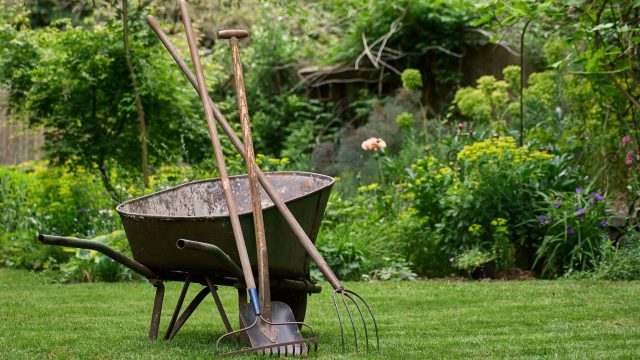07
Jun
Tell Home Depot and Lowe’s to Promote Herbicide Alternatives; Organic Is Focus of June 8 Forum

(Beyond Pesticides, June 7, 2021) Beyond Pesticides and Friends of the Earth (FOE) collaborated to analyze herbicide products at two of the most popular home and garden retailers, Home Depot and Lowe’s. This new Commercial Herbicide Analysis highlights the adverse health and environmental effects of widely available toxic pesticides while encouraging retailers to expand on—and consumers to use—safer, least/nontoxic pesticide approaches.
According to Akayla Bracey, Beyond Pesticides’ science and regulatory manager and lead researcher on the review, “People generally aren’t aware that the pesticides widely available in garden retailers like Home Depot and Lowe’s are a threat to health and the environment, and that there are safer approaches that are available and used in organic land management.”
When it comes to weeds, gardeners need good tools that enable them to control them with minimal effort and damage to their plants. Although gardeners differ in their preference for style of garden hoe, all must be sharp to operate efficiently, so files for sharpening should be located near the hoes, and customer service representatives should be prepared to demonstrate their use.
Weed-free and chemical-free organic mulches—such as straw or wood chips—are garden essentials for both weed control and long-term organic fertility. Speaking of fertility, natural fertility builds healthy soil for growing strong plants that resist insect and disease damage, while synthetic fertilizers kill valuable soil organisms. Stores should stock fertility products approved for use in organic production.
Friends of the Earth composed a comprehensive list of products sold by Home Depot and Lowe’s by browsing online and local stores. Furthermore, the organization allowed each retailer to review and edit the list. Beyond Pesticides evaluated active ingredients in all products and performed a toxicity analysis using available epidemiological and laboratory and studies.
The analysis, conducted by Beyond Pesticides, reveals that approximately half of all Home Depot herbicide products (24 of 51) and Lowe’s herbicide products (23 of 40) contain ingredients considered Highly Hazardous Pesticides (HPPs). The United Nations Food and Agriculture Organization (FOA) classifies HHPs as “pesticides linked with a high incidence of severe or irreversible adverse effects on human health or the environment.” The following active ingredients pose the most harm to human, animal, and ecosystem health, including cancer, reproductive harm, neurotoxicity, and hormone (endocrine) disruption: glyphosate, 2,4-D, dicamba, mecoprop, and pendimethalin. Of these five chemicals, all but dicamba are classifiable as HHPs. Only 29 percent of Home Depot (15 of 51) and 17 percent of Lowe’s (7 of 40) herbicide products qualify as least-toxic or organic.
View the analysis, and for more information, see Beyond Pesticides Lawns and Landscapes webpage and Products Compatible with Organic Landscape Management.
P.S. Learn more about encouraging organic land care practices in your community by tuning in to Day 3 of the virtual National Pesticide Forum on June 8. REGISTER NOW.
Letter to Home Depot and Lowe’s
A recent report by Beyond Pesticides and Friends of the Earth showed that about half (23 of 40) of the herbicide products stocked by your stores contain ingredients considered Highly Hazardous Pesticides (HPPs). The United Nations Food and Agriculture Organization (FOA) classifies HHPs as “pesticides linked with a high incidence of severe or irreversible adverse effects on human health or the environment.” The following active ingredients pose the most harm to human, animal, and ecosystem health, including cancer, reproductive harm, neurotoxicity, and hormone (endocrine) disruption: glyphosate, 2,4-D, dicamba, mecoprop, and pendimethalin. Of these five chemicals, all but dicamba are classifiable as HHPs. Only 17 percent of Lowe’s (7 of 40) herbicide products qualify as least-toxic or organic.
Many customers are unaware of what chemicals are in the products they use, let alone their chemical effects. When it comes to weeds, your customers need good tools that enable them to control them with minimal effort and damage to their plants. Although gardeners differ in their preference for style of garden hoe, all must be sharp to operate efficiently, so files for sharpening should be located near the hoes, and customer service representatives should be prepared to demonstrate their use.
Weed-free and chemical-free organic mulches—such as straw or wood chips—are garden essentials for both weed control and long-term organic fertility. Speaking of fertility, natural fertility builds healthy soil for growing strong plants that resist insect and disease damage, while synthetic fertilizers kill valuable soil organisms. Please stock fertility products approved for use in organic production.
Please replace the highly hazardous pesticide products in your stores with products (bp-dc.org/WSHS-brochure) to help customers grow organically—high quality tools, organic materials, and least-toxic pesticides (bp-dc.org/organic-compatible) approved for use in organic production.
Thank you.











I wish this post was more accurate, “herbicide” and “pesticide” seem to be used interchangeably throughout the article. The intent of the post is admirable, the execution leaves a lot to be desired.
June 7th, 2021 at 9:23 pmJohn,
June 8th, 2021 at 11:22 amThanks for your comment. This is a common misconception.
“Pesticide” is an umbrella term that includes herbicides, insecticides, fungicides, rodenticides, and all other -cides intended to mitigate, repel, or kill a pest or weed.
Read more about this on our informational page, “What is a Pesticide?”:https://www.beyondpesticides.org/resources/pesticide-gateway/what-is-a-pesticide
– Beyond Pesticides staff